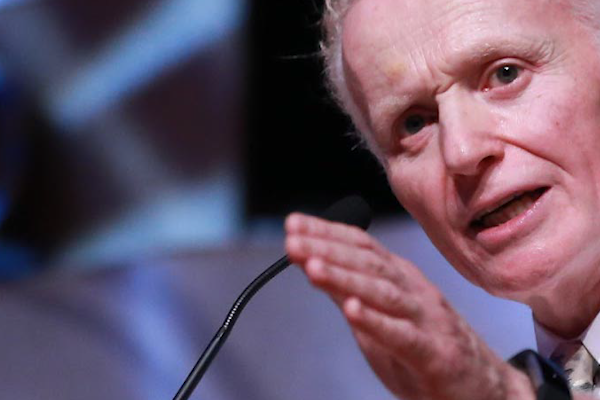My friend and mentor, Purdy Crawford, a giant of the Canadian legal and business world, passed away yesterday. His death marks the passing not just of a man and a friend, but of a powerful standard setter in the business world. Many of us strive to emulate the high ideals that Purdy lived up to so effortlessly, while we continuously fall short.
The details of Purdy’s career are so well known as not to need repeating by me. A good summary is found in the piece in today’s Financial Post.
What I can add are the few meagre insights afforded me by the close contacts I had with Purdy over roughly the last 20 years.
As everyone knows, Purdy was a Nova Scotia boy, born in Five Islands, NS, son of a coal miner. Purdy never forgot those roots, and to the end of his days maintained a summer home in Five Islands which was his refuge from the hurly-burly of business life.
The region was not merely a summer home; he retained a life-long passion for seeing it recover from the economic doldrums into which it has sunk. It was in that context that I came to know Purdy. In 1994 I founded a regional think tank on Atlantic Canadian issues called the Atlantic Institute for Market Studies (AIMS), devoted to the notion that most of the diagnosis of Atlantic Canada’s ills over the last 40 years has been deeply mistaken. We made the case that heaping ever more government “aid” on the region had become the source of its economic enervation, not a solution to it. Our first book, Looking the Gift Horse in the Mouth, won international acclaim and the Sir Antony Fisher Prize for laying out the argument in an early form.
In founding AIMS I had the help of two of the most senior lawyers in the region, George Cooper and the late Bill Mingo. George was a Tory, and former MP from Halifax, Bill was a prominent Liberal and fundraiser for the party, thus signalling our firm intention to avoid partisanship and focus on thoughtful analysis.
With the help of Bill and George we set about recruting our first board of directors. Ced Ritchie became our first chairman and Bill and George were both excited when we were also able to land Purdy Crawford (along with a stellar list of other Atlantic Canadian business and community leaders) as a director.
When Ced stepped down as chairman,we asked Purdy to take over. I was stunned when one day Purdy walked into the AIMS offices, in a rented back room in a lovely old brick house (belonging to the Proactive Group) on Barrington St. He sat down and proceeded very gently to probe me as a person and my plans for the institute. I guess this “interview” was successful because he agreed to become chairman, a post he held for the next 5 years or so. Even more importantly he became my mentor.
Mentoring young people was one of Purdy’s passions. If he “took you on” you could count on him to respond to your every call or e-mail, and to promote you and your work to influential people who he thought could be helpful to you. His mentoring wasn’t always comfortable, though. I remember well an incident where a PEI education official had made some dismissive remarks about the AIMS report card on the region’s high schools. We responded quite strongly, not least because a number of the criticisms levelled by this gentleman against the report card were inaccurate and clearly showed he was not familiar with the report card itself.
Since it was a report about the education system, we thought we were being very clever when in a media release we ironically tasked the gentleman in question with not knowing how to read. Purdy was on the phone to me within a day. He was not angry, but I knew he was disappointed and that was far more painful to me than his anger would have been. Even disappointed as he was, however, he listened patiently to my account of what we had done and why, and when we had talked it all over, he finished the call by saying how lucky the institute was to be under my leadership. I felt simultaneously chastened and exalted — no mean feat and an object lesson in how to be a mentor who leaves his mark and calls constantly on his charges to reach higher.
Purdy was also a man of great courage. When asked by the Truro Chamber of Commerce to speak at a big gala dinner not long after he became AIMS chairman, he asked me to write a speech for him about the economic challenges of the region. As is my wont, I wrote him something that directly challenged the cherished beliefs of many people in the audience, talking about the damage that EI, subsidised steel plants and regional development programmes had caused. I was at a table in the room and the tension in the air was palpable in certain quarters, but he unapologetically gave the speech and his tremendous prestige and authority allowed him to carry off with aplomb what would have got lesser men run out of town on a rail.
My greatest lesson in courage and leadership from Purdy, however, was a much more painful one for me. AIMS had published a paper about NB Power, the provincial electricity utility in New Brunswick, in which we quite wrongly implied that the utility’s board did not exercise proper care and attention over nuclear safety issues. I had read the paper and got outside expert readers to comment as part of our standard quality control process, but nobody was reading it from a legal as opposed to a technical point of view and none of us caught the significance of the sentence in question.
Rest assured the board of NB Power caught it. They threatened to sue not just the Institute, but every individual member of the Institute’s board. The CEO of a very large New Brunswick company that did a lot of business with NB Power was on my board and he was absolutely livid. The life of my young institute hung in the balance. I was terrified. Purdy’s reaction was that if you’ve never been sued you weren’t doing anything.
Purdy called an emergency board meeting and listened to my explanation of what had occurred, including my plea that whatever we did, we must not cave into NB Power’s attempt to have the entire paper withdrawn over one sentence, as this would leave the institute’s reputation for fearless commentary in tatters. Then he set his jaw and calmly swung into action. He quickly saw to it that NB Power was clear that the offending sentence would be withdrawn and an apology issued, but that the paper otherwise stood. He talked down the upset members of the board. No one resigned. NB Power accepted the tightly-framed apology. We survived, almost entirely due to his calm fortitude in the face of what could have been a mortal threat to the Institute. Purdy never breathed a word about it to me again.
A different story that reveals much about Purdy’s deft way with people and his ability to play his cards carefully and cleverly when he needed to was the following: curious about Purdy’s political leanings, if any, I asked George Cooper and Bill Mingo about it, since I felt they would certainly be in a position to know. George Cooper, the Tory, said without a moment’s hesitation, “He’s a Liberal”. Bill Mingo, the Liberal’s, response: “Oh, he’s a Tory.” My sense, after many years of knowing him, was that Purdy was a pragmatist, although it seems indisputable that his mother, with whom he was close, was a “known Liberal.”
Purdy was also a gifted fundraiser — his calls were always returned, no matter how mighty the person on the receiving end. And if Purdy said “we have to get behind this thing”, people did. I seem to recall that when he backed the corporate fundraising campaign of McGill, they easily met their target of something like $100m. We didn’t raise anything like that for AIMS, alas, but we certainly put the organisation on a strong sustainable footing thanks to his support.
When after about 20 years at the helm of AIMS my ambition to start a national think tank led me to want to move on to Ottawa, Purdy backed me there too, and graciously agreed to serve on the new Macdonald-Laurier Institute’s Advisory Council, a post he occupied until his untimely death, proudly signalling to the world his continued support for his eternally grateful student.
Purdy was one of a kind, but that will not prevent all of us who benefited from his leadership from doing all we can to continue to act on the values he helped to instill in us. Knowing him was an unforgettable privilege – I stood on the broad shoulders of a giant who never let me down.
“Lives of great men all remind us we can make our lives sublime,and, departing, leave behind us, footprints on the sands of time.”




RT @brianleecrowley: My tribute to friend and mentor Purdy Crawford, dead yesterday at 82: http://t.co/jnS1JfCosm. Purdy was giant of CDN l…
RT @brianleecrowley: My tribute to friend and mentor Purdy Crawford, dead yesterday at 82: http://t.co/jnS1JfCosm. Purdy was giant of CDN l…